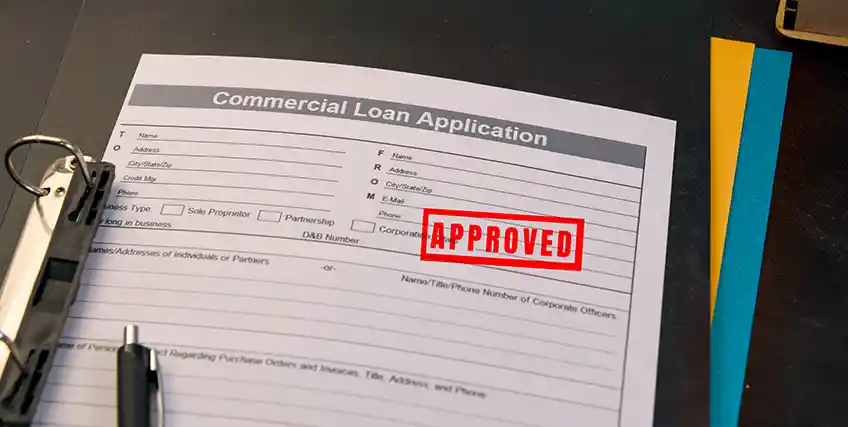Cheap Business Loans: How to Find Affordable Financing for Your Small Business
November 05, 2025 | Last Updated on: November 05, 2025

Key Takeaways:
- what defines cheap business loans and how they help lower overall borrowing costs for small businesses.
- different affordable financing options such as SBA programs, bank loans, and credit unions.
- practical tips to qualify for low-cost business financing and manage repayment effectively.
Running a small business requires the skill to maintain the right balance of ideas and resources. Along with strategy and passion, businesses must have access to the right capital to stay resilient and prosper.
Whether you're running a new startup, looking for a commercial real estate loan, or simply aiming to keep a steady cash flow, finding the right business financing is a matter of concern.
Small business owners can fuel their growth by finding cheap business loans. These are funding options that come with reasonable interest rates, fair repayment terms, and low fees. There are several lenders in the U.S. that offer affordable business loans like SBA programs, banks, credit unions, and digital lending platforms. The loan terms may vary across all of these options.
This article explores cheap business loan options in the U.S., tips to qualify for one, and which options can help businesses keep costs down while meeting the business goals.
What Are Cheap Business Loans?
When we talk about cheap business loans, we're referring to financing that keeps your total cost of borrowing low. That may not necessarily mean a lower interest rate. A cheap business loan also includes fair origination fees, flexible repayment terms, and predictable monthly payments.
This is because there are times when the interest rate is quite low for a loan, but there are other costs, which when add up can significantly increase the overall cost of the loan.
Cheap business loans are a great relief for small business owners trying to succeed in a competitive market. However, these loans usually come with strict eligibility criteria and difficult application process.
Lenders like traditional banks, credit unions, or online lenders with competitive underwriting practices, generally offer cheap business loans to borrowers with good creditworthiness.
Apart from traditional lenders, the U.S. Small Business Administration (SBA) plays a major role in supporting affordable funding across U.S. However, SBA does not offer these loans directly, but through trusted lenders. These SBA-backed programs help reduce risk for lenders, allowing them to extend cheaper credit to small businesses.
Characteristics of Cheap Business Loans
Cheap business loans are designed to make borrowing more cost-effective for small businesses. Here are some of the key characteristics that make them an attractive funding solution:
- They usually have competitive interest rates along with a structure that keeps overall borrowing costs low.
- Repayment terms of cheap business loans are often moderate to long, which allows for more manageable monthly payments.
- Most lenders offering cheap commercial loans maintain a transparent fee structure with no hidden charges, so that borrowers know exactly what they'll be paying.
- To qualify for small affordable loans, businesses often need to show a good credit score or steady annual revenue. This is because these loans usually come from well-known lenders, credit unions, or SBA-backed programs that follow responsible lending standards.
How Cheap Business Loans Help Small Business Owners?
Cheap business loans can support a wide range of business goals like covering short-term working capital, financing major business purchases, investing in commercial real estate, and business expansion. Because they're designed to be affordable, they help small business owners focus on growth instead of worrying about high-interest debt.
Here's how an affordable loan can benefit your business:
- Stabilize cash flow during slower seasons.
- Purchase equipment or technology through low-rate equipment financing.
- Invest in commercial real estate without overextending your budget.
- Refinance older, high-cost debt into a lower-rate facility.
- Expand operations while maintaining healthy leverage ratios.
Affordable lending encourages business sustainability. With better repayment terms, reasonable loan amounts, and lower origination fees, business owners can reinvest profits instead of losing them to interest payments.
Types of Cheap Business Loans
Every loan with a low advertised rate may not be truly affordable. Understanding different loan programs helps identify the right fit. Here are some types of financing that may qualify as cheap business loans for most borrowers:
1. SBA Loans (SBA 7(a) and 504 Programs)
Backed by the U.S. Small Business Administration (SBA), these loans are among the most affordable small business loans available in the U.S. market. The SBA doesn't directly lend money to businesses, instead, it partners with approved and trusted lenders such as banks, credit unions, and nonprofit institutions to guarantee a portion of the loan. This guarantee reduces the lender's risk and allows them to offer competitive interest rates, longer repayment terms, and lower down payments.
SBA loans are ideal for funding working capital, real estate purchases, or equipment loans. While the underwriting process can take more time than conventional loans, the potential long-term savings and flexibility often make it worth the effort for qualified borrowers.
2. Term Loans from Banks or Credit Unions
Traditional business banks and credit unions are know to provide cheap commercial loans for established companies with strong creditworthiness. Borrowers with steady annual revenue, solid financial statements, and proven business history often secure the best rates and flexible repayment schedules.
3. Business Lines of Credit
A business line of credit is a revolving credit option that gives business owners flexible access to funds as needed, similar to how a credit card works. You can draw from the available limit whenever cash flow gaps arise and pay interest only on the amount you use, not the total credit line.
This type of financing is especially useful for managing seasonal expenses, inventory purchases, or unexpected costs. When managed responsibly, a line of credit can be one of the most cost-effective financing options, helping maintain steady cash flow without taking on unnecessary long-term debt.
4. Equipment Financing and Real Estate Loans
Both equipment financing and commercial real estate loans can qualify as cheap financing if they structured with favorable terms like fixed interest rates, low origination fees, and long repayment terms. They also often use the asset itself as collateral, helping secure better rates.
5. Microloans and Nonprofit Lending
Some nonprofit organizations and community development financial institutions (CDFIs) offer small affordable loans to startups or underserved business owners.
Tips to Qualify for Cheap Business Loans
Lenders offering cheap business loans usually follow strict eligibility criteria, so it is important to demonstrate that your business is a responsible and low-risk borrower. Lenders assess multiple factors during the underwriting process to determine eligibility and pricing.
Here are some key areas lenders focus on:
- Credit Score and History: A strong personal credit score and, where applicable, a solid business credit profile show reliability and repayment discipline. Maintaining a good credit record helps you qualify for lower interest rates.
- Annual Revenue and Profitability: Lenders prefer to see consistent earnings and stable cash flow, as this reassures them that your business can manage ongoing payments comfortably.
- Business Age and Stability: Established businesses generally qualify for the best terms. However, new businesses can also access affordable financing if they show growth potential or have a strong business plan.
- Debt-to-Income Ratio and Collateral: Some term loans or real estate loans may require partial collateral or a personal guarantee, which reduces lender's risk and unlock better rates.
- Complete Documentation: Submitting accurate bank statements, tax returns, and financial projections strengthens the credibility of the borrower. It also helps speed up the loan application process.
By preparing these elements in advance, businesses improve their chances of securing truly affordable small business loans with favorable terms.
Ways to Make Your Loan More Affordable
Here are a few practical steps that may help you reduce your total borrowing cost:
- Compare multiple lenders: Review offers from traditional banks, credit unions, and online lenders to identify the lowest interest rates and fees.
- Negotiate terms: Borrowers with good credit can often negotiate repayment terms or reduce origination fees.
- Choose fixed-rate products: They prevent unexpected hikes and make monthly payments predictable.
- Avoid unnecessary add-ons: Extra insurance or bundled products can raise total cost.
- Consider prepayment options: Paying off a loan early (without penalties) saves on interest.
- Maintain strong credit: Responsible use of business credit cards and credit lines improves business credit profile, leading to cheaper future loans.
When a Cheap Business Loan May Make Sense
Cheap business loans come with varied terms and may not always align with your business goals and needs. This is why opting for a cheap business loan is a wise move when businesses are:
- seeking long-term stability with manageable monthly payments.
- plan to invest in assets or expansion projects that yield steady returns.
- wanting to refinance existing high-interest obligations.
- are building credit and aiming to establish a reliable borrowing record with your business bank or credit union.
Common Mistakes to Avoid When Seeking Cheap Business Loans
While cheap business loans can be a great way to access affordable financing, it's important to approach them carefully. In the excitement of finding cheap loans, businesses might overlook or make a few mistakes. Here are some common ones to avoid:
- Owners sometimes focus entirely on the interest rate and do not consider the total borrowing cost which may include fees or insurance add-ons.
- Overlooking eligibility requirements is a big mistake borrowers usually make. Applying before meeting the lender's benchmarks for creditworthiness or annual revenue, can lead to unnecessary rejections.
- Another common misstep is overborrowing, taking on more debt than the business actually needs. This can affect cash flow and increase repayment pressure.
- One very important tip for businesses is to always review the fine print on documents to understand terms related to prepayment, refinancing, and potential rate adjustments. Missing this fine information may sometimes later result into chaotic surprises.
Conclusion
Finding the right cheap business loan is about more than simply securing funds, it's about choosing financing that aligns with your goals, supports your cash flow, and helps your business grow sustainably. Affordable lending options can play a crucial role in strengthening a company's financial foundation, whether the need is for expansion, refinancing, or maintaining day-to-day stability.
By exploring programs like SBA loans, term loans, or business lines of credit, and by preparing strong financial documentation, business owners can improve their eligibility for low-cost financing. Careful comparison of lenders, transparency in understanding total costs, and disciplined financial management can help ensure that every borrowed dollar contributes meaningfully to growth.
Ultimately, a cheap business loan should make financing easier, not riskier, allowing small business owners to focus on what truly matters: building lasting value and long-term success.
FAQs About Cheap Business Loans
1. How to know if a business loan is “cheap”?
A cheap business loan generally carries a low interest rate, reasonable repayment terms, and minimal additional fees, keeping the total borrowing cost manageable. Transparency in pricing and clear disclosure of terms are also important indicators of an affordable loan.
2. Where can I find the cheapest business loans?
Affordable financing options are often available through SBA-backed programs, credit unions, and reputable online lenders known for clear pricing and flexible repayment structures. Comparing multiple offers and reviewing lender credibility can help identify truly low-cost financing opportunities.
3. Can startups qualify for cheap business loans?
Startups may qualify for microloan programs or funding from nonprofit lenders that focus on supporting new businesses with limited credit history. Maintaining organized financial records and presenting a sound business plan can strengthen eligibility.
4. Do cheap business loans require collateral?
Collateral is not always required. Many affordable small business loans are unsecured, but providing collateral often helps secure even lower rates.
5. How can I make my existing business loan cheaper?
An existing loan can become more affordable through refinancing at a lower rate, negotiating improved repayment terms, or making prepayments when permitted without penalty. Maintaining a strong credit profile and timely repayment history can also improve access to better loan offers in the future.
Frequent searches leading to this page
Term Loans are made by Itria Ventures LLC or Cross River Bank, Member FDIC. This is not a deposit product. California residents: Itria Ventures LLC is licensed by the Department of Financial Protection and Innovation. Loans are made or arranged pursuant to California Financing Law License # 60DBO-35839




